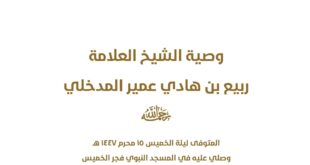Imam al-Awzaaʿi said:”We, and the Tābiʿūn while they were many, used to say: Indeed, Allah, the Exalted, is above His Throne, and we believe in what has come in the Sunnah regarding His Attributes.”[Ijtimāʿ al-Juyūsh al-Islāmiyyah, p. 43]
Muḥammad ibn Isḥāq ibn Khuzaymah, may Allah have mercy on him, said:”Indeed, the reports about the Attributes of Allah are in agreement with the Book of Allah, transmitted by the successors from their predecessors, generation after generation, from the time of the Companions and the Tābiʿūn up until our time on the basis of affirming the Attributes of Allah, knowing Him, believing in Him, and submitting to what Allah has informed in His Revelation while avoiding interpretation (ta’wīl), rejection (juhūd), likening (tamthīl), and description of the manner (takyīf).”
[Mentioned by Ibn Qudāmah in Dhamm al-Ta’wīl, p. 18]Imām Ibn Khuzaymah, may Allah have mercy on him, said:
“So we — and all of our scholars from the people of al-Ḥijāz, Tihāmah, Yemen, ʿIrāq, al-Shām, and Egypt — our creed is:
We affirm for Allah what Allah has affirmed for Himself; we state this with our tongues and believe it in our hearts without likening the Face of our Creator to the face of any of the created beings. Exalted is our Lord above resembling the created, and Majestic is our Lord above the statements of the negators. And He is too Mighty to be non-existent, as the false claimers say for that which has no attribute is non-existent. Far exalted is Allah above what the Jahmiyyah say those who deny the Attributes of our Creator which He described Himself with in His Clear Revelation and on the tongue of His Prophet Muḥammad ﷺ.”
[Kitāb al-Tawḥīd by Ibn Khuzaymah, vol. 1, p. 25]And all those who authored works on ʿAqīdah (creed) from among the people of ḥadīth agreed upon transmitting this belief regarding the Names and Attributes of Allah from the Companions and the Tābiʿūn. Among the later scholars who authored on creed following the methodology of narration with chains of transmission was
Imām al-Ājurrī — may Allah have mercy on him — [d. 360 AH], who said:
“Know — may Allah grant us and you success in righteous speech and action — that the people of truth describe Allah, the Mighty and Majestic, with what He described Himself, and with what His Messenger ﷺ described Him, and with what the Companions described Him. This is the creed of the scholars — those who followed and did not innovate. And it is not to be said: ‘How?’ Rather, submission and belief in it is required.”[al-Sharīʿah, 2/51]
Shaykh al-Islām Ibn Taymiyyah — clarifying the condition of the Companions (may Allah be pleased with them) regarding the fundamentals of the religion — said:
“The Companions did not differ in any of the fundamentals of Islam — not in the Attributes (of Allah), nor in Divine Decree (al-Qadar), nor in issues of rulings, nor in issues of Imāmah. They did not differ in that through disputes in speech, let alone by fighting with the sword. Rather, they affirmed the Attributes of Allah that He informed about Himself, while negating any resemblance to the attributes of the created beings. They affirmed the Divine Decree as Allah and His Messenger informed, and affirmed the command and prohibition, the promise and threat, and the wisdom of Allah in His creation and command. They affirmed the power and ability of the servant, and his actions — along with affirming the Divine Decree — and other such foundations and principles of Islam.”
[Minhāj al-Sunnah, 6/336]Ibn al-Qayyim — may Allah have mercy on him — said:
“Indeed, the Companions disputed over many issues of rulings — and they are the leaders of the believers and the most complete of them in faith — yet, praise be to Allah, they did not differ in a single matter from the matters of the Names, Attributes, or Actions (of Allah). Rather, all of them unanimously affirmed what is stated in the Book and the Sunnah, with one word, from the first of them to the last. They did not call it interpretation (ta’wīl), nor did they distort it from its meanings through alteration. They did not nullify any of it, nor did they strike analogies for it. None of them said: ‘It is obligatory to divert it from its apparent meanings and carry it upon figurative interpretation.’ Rather, they accepted it with submission, received it with faith and veneration, and treated the whole matter as one and the same… They did not do as the people of desires and innovation did those who divided it into parts, affirming some of it and denying other parts without a clear criterion even though the necessary implication of what they denied is the same as that of what they affirmed and accepted.”
[Iʿlām al-Muwaqqiʿīn, 1/83–84]Imām al-Lālakā’ī — may Allah have mercy on him — said:
“It is obligatory to know Allah, the Exalted, and His Attributes through hearing (i.e., revelation), not through reason(i.e., Aql)”[Sharḥ Uṣūl Iʿtiqād Ahl al-Sunnah, 2/216]
Ibn Taymiyyah may Allah have mercy on him said :
The Attributes of Allah are tawqīfiyyah — meaning they are based solely on textual evidence — so they are neither affirmed nor denied except with proof from the Qur’an or the Sunnah. And the Qur’an and Sunnah came in the language of the Arabs, and must be understood according to the understanding of the Arabs. Any interpretation of the meanings of the Qur’an and Sunnah that contradicts what the Arabs would understand is a distortion of the words.
Imām Aḥmad — may Allah have mercy on him said:”
Allah is not to be described except with what He has described Himself or what His Messenger ﷺ has described Him with; one must not go beyond the Qur’an and ḥadīth.”
[al-Ḥamawiyyah, p. 61] World Dawah Quran & Sunnah through understanding of Salaf
World Dawah Quran & Sunnah through understanding of Salaf

